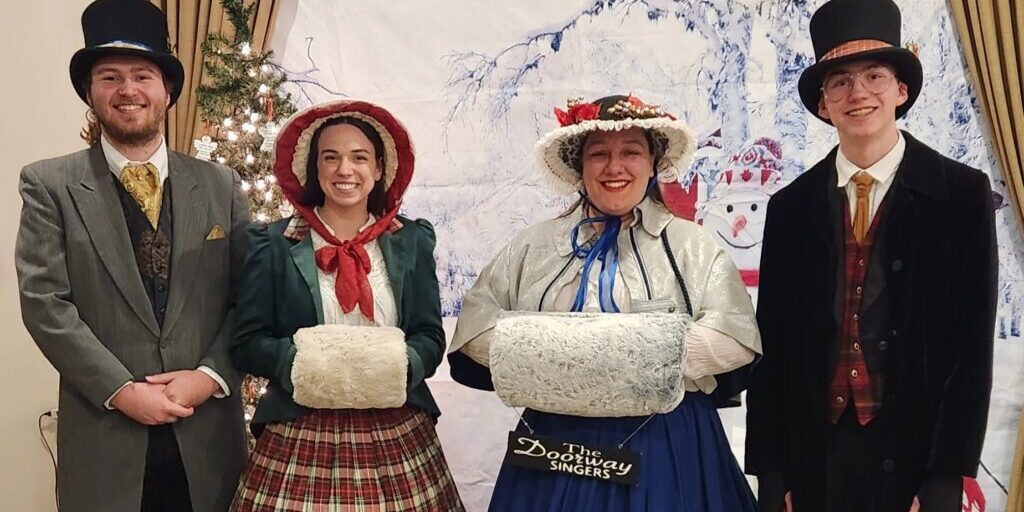
“Here Is What Christmastime Means To Me”
Bryce Collins
From Monastery to Main Street
“Christmas makes you feel emotional / It may bring parties or thoughts devotional / Whatever happens or what may be, here is what Christmas time means to me…”
As my friend Sarah Schweit, the music director and fellow soprano in The Doorway Singers, once said, “Music, regardless of its genres, is always going to be close to people. It exists across all cultures and all over the world because it’s innately a human thing.” In ancient civilizations, music began as a form of oral transmission, commonly practiced in Greek, Hebrew, and Latin cultures, in which music was preserved without written notation. During the Middle Ages, music was written only for the purpose of sacred Christian worship. Famous nuns and monks, like Hildegard of Bingen, had evolved the monophonic Gregorian chants to polyphonic and melismatic lines of notes. During the age of the Renaissance, more secular music arose in popularity, as it focused on the daily cycles of human life and traditions instead of heavy religious themes. A prime example of this can be seen with one genre that dominates at the end of every year: Christmas music.
If you are a passionate connoisseur of holiday music, like myself, you’d know that the lyrics above are the intro to The Judds’ version of “Silver Bells”, a classic holiday track originating from the 1950 film The Lemon Drop Kid. This beloved Christmas tune has deeply played at my heartstrings and self-reflection during this Christmas season since I joined The Doorway Singers, a Hampton Roads-based singing group that travels around Virginia and North Carolina. During the holidays, we go quartet-style, dressed in Dickensian caroler garb, and sing a cappella Christmas carols.
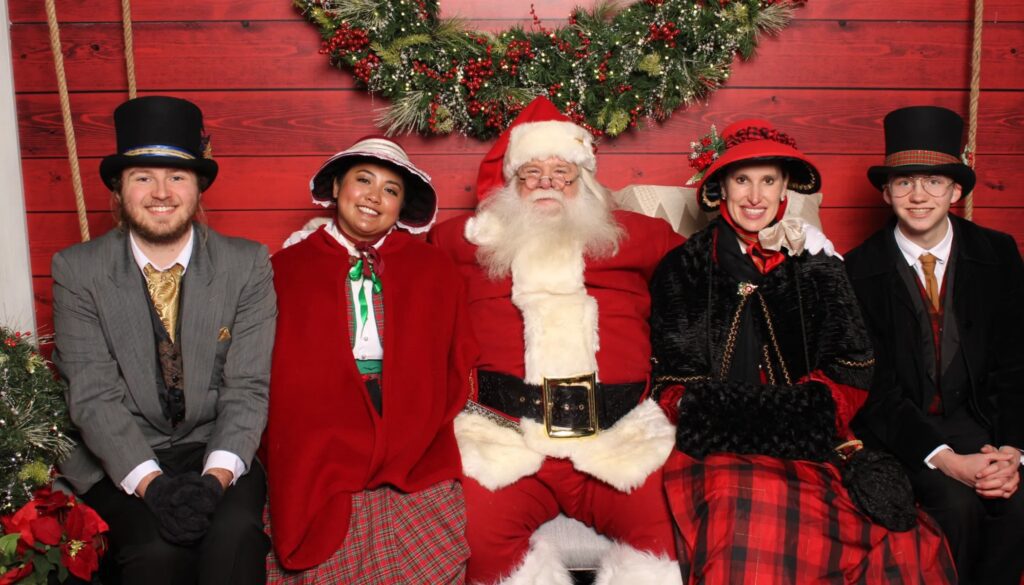
The Collins Legacy
Ever since at a young age, what I always enjoyed about singing and performing was that it was an opportunity in creating a joyful community, not just with performers but with the audience and the local area of the performances. Later in this piece, I’ll return to the special meaning of “Silver Bells” and its relation to my singing experience this holiday season.
I’d like to start by providing a contextual background about myself and my Doorway beginnings: I am a Hampton Roads native, born and raised in Virginia Beach. From the time I declared toddler independence, gaining the powers of hand grabbing, standing and walking on my two feet, I have always put on performances for my family and created a bunch of noise, also known as “music”. Another term that is observed by more optimistic parents for their children is “pure entertainment”. There is a photo of a two-year-old me playing a set of pots and pans with my uncle’s drumsticks. That same day was when my mom realized I inherited “the Collins performer gene.”
My mom’s family consists of musicians who played in the area for many decades. My great-grandfather exemplified the definitive charismatic country music frontman. He would have made it to Nashville with his voice and Washburn 6-string acoustic if he had the chance. From the few times we were at functions with him, I always recalled some old fellow he’d known that rushed up to him saying, “Well, look who it is, it’s ‘The Guitar Man’ himself, Ralph Collins!” He and my great-grandmother were the George Jones and Tammy Wynette of my family, and my Grandad Harrison was the bass player in their country band.
My grandfather focused his craft in the percussion section of the instrument family tree, and he was the drummer for my great-grandparents’ band. Even today, there’s never been one time where me and my mother will be eating dinner in a pub-style restaurant with a live band and not say to each other, “They need to fire that drummer. Grandad Hank could groove better to Fleetwood Mac than him.” My uncle followed his father’s footsteps in being a drummer with a diverse musical taste. He is also a wizard in home recording technology and beholds an expansive knowledge of different applications and production history. As a knowledgeable musician myself, I continue to learn new techniques from him that I did not know beforehand.
Throughout my childhood and adolescence, I performed in theatrical productions in and outside of school. In addition, I’ve continued to play multiple instruments, including guitar, drums, and piano, and sung in both my middle and high school choirs. I started getting involved in the local arts community back in 2019 when I performed in Spamalot! at the Little Theatre of Virginia Beach. It was March 25th, 2024, when I joined as a Principal Bass in Doorway. I started my first year by performing in our Doorway Salutes program, which is a show that pays tribute to the USO and the U.S. Armed Forces. One of the reasons I joined the group was because of their Christmas caroling gigs, and I could not have been more jolly when the caroling rehearsals were right around the corner.
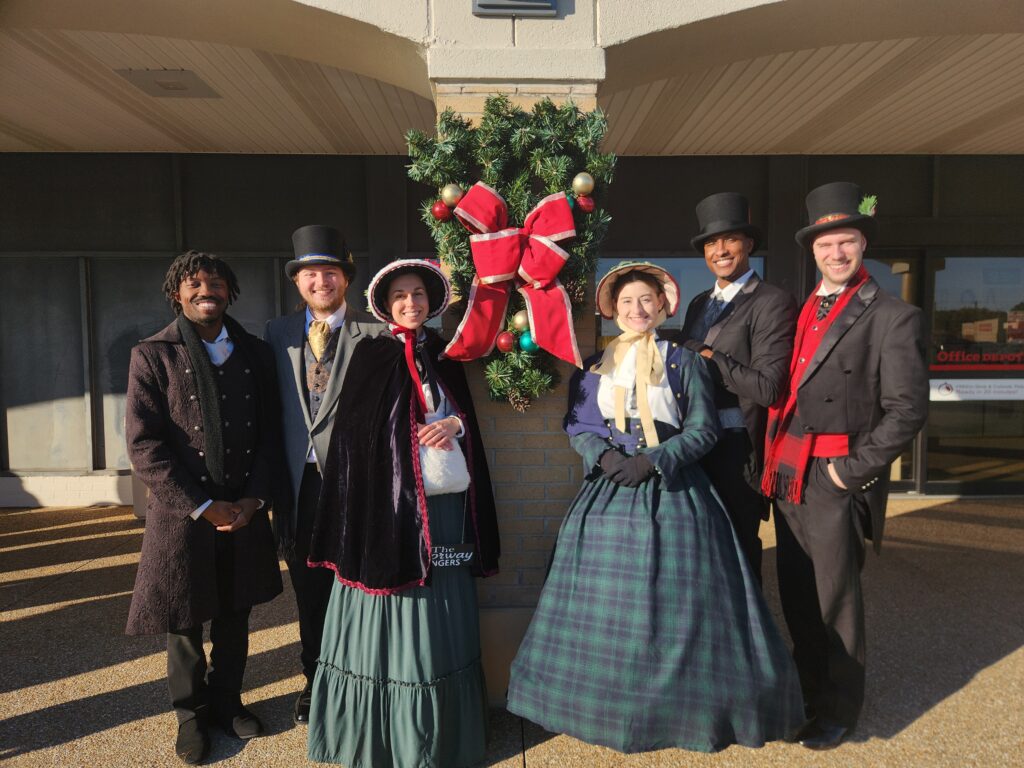
Crafting Christmas Magic at First Lutheran
Our music rehearsals for the Christmas season spanned two months, from the warm autumn of early September to the frosty breezes of the late November month. We were graciously offered a rehearsal space on the third floor of First Lutheran Church, a 130-year-old landmark located in the downtown historic area of Ghent in Norfolk. The main hall spaciously consisted of vaulted ceilings, dining tables, a UMC banner, and a cross-stitch portrait of Leonardo da Vinci’s The Last Supper. In the center of the room were eight groups of four chairs, set for the SATB quartets, and a Roland electric keyboard that consistently went out of tune (an interesting tidbit I was unaware of regarding keyboards built before 1980). First Lutheran has been known to give back and support the community. One of their missions is to provide shelter and food to the homeless and needy. The church’s music director informed us on our first day of rehearsal that we should leave the homeless folks as be; however, some of them out front noticed our weekly rehearsal pattern. Whenever we walked to our cars after rehearsals, they would say, “Have a good night. We hope your rehearsal went well.”
The Christmas rehearsals ran like clockwork: strict, exact, and efficient. Once everyone got settled, Sarah Schweit would go to the keyboard and announce, “Good evening, everyone! Let’s stand and do some vocal warmups. We only have two hours for rehearsal time, so let’s focus and make our time together efficient. Okay?” Once we finished humming major scales and singing our O-E-O-E-O’s, Sarah followed with, “How are we feeling about doing sectionals today? We have enough time to do six minutes.” About half of the time, all the voice parts would separate into different halls and offices on the third floor to practice sectional parts. There was always this one classroom at the end of the hall that the Basses fought over with the Altos. Sometimes, we were victorious, but most of the time, we had to practice in the stairwell, booing the Altos as they said, “Sorry, guys! Should have been quicker.” As we began, Andrew, our Bass sectional lead, would ask, “Are there any songs we’re having a difficult time on?” The basses would decide which songs were super easy and which ones needed to be prioritized. First, we would go over the challenging pieces from different sets, and Andrew would instruct us, “Let’s go from the top to measure number…” or “How about we repeat this phrase again?”
After our sectional time wrapped up, all the parts returned to the main rehearsal space, and then we began rehearsing the material together as a full company of over thirty people. The general number of songs we had to learn weekly amounted to seven; however, there were rehearsals that depended on whether it was somebody’s first year or a returning “veteran”, so “1st Years”, including myself, had to learn two new songs and then rehearse any pieces that needed review. Before we began singing, Sarah would ask, “Which of the Tenors wants to blow the pitch and count us in?”, referring to the duty of the Tenors who have to blow their pitch pipe for the starting note and count everyone in. There would be moments where some singers would either go flat or sharp, and Sarah would have to stop and say, “Hold on, let’s get the correct pitch and start over.”
What is so amazing about the Christmas caroling music is its diversity in aspects of time period and culture. Our group sings hymns dating to 13th-century France, as well as carols from the 15th to 18th centuries, originating from Germany, England, Spain, and the United States. Sarah would instruct the group that, “for any of the traditional hymns and carols, we want to sing ‘Doorway Dark’, so sing the notes and lyrics with a darker intonation.” For songs like “Deck the Halls,” “Joy to the World,” and the Hanukkah classic, “S’vivon,” Sarah would coach us to embrace those songs as bouncy, celebratory, and festive statements; however, for songs like the Italian carol “Dormi Dormi” and “O Holy Night” Sarah would guide us to sing those songs more slowly and smoothly, swinging like a lullabyOur set also includes modern, secular songs ranging from the 19th to 20th centuries. Sarah would say in our rehearsals, “Any of our Christmas songs that follow along the pop and jazz styles will be ‘Doorway Bright,’ where singers will have a lighter intonation in their singing.” Sarah gave the group a note once about the “Children’s Show” songs, which are more kid-friendly songs from movies and TV, like “Rudolph” and “Frosty”: “It is very important that you are interactive and energetic during the ‘Children’s Show’ songs. You have no idea how many times you will be asked by shy children, ‘ummm…can you sing “Jingle Bells”?’ You’ll be singing “Jingle Bells” on absolute repeat!”
Thus, it all comes back to the lyrics in “Silver Bells: “Here is what Christmas time means to me.” I will be exploring the answer through describing some impactful gigs I have been on, while asking five specific questions about my personal experience and impact on the community through a capella singing this holiday season.
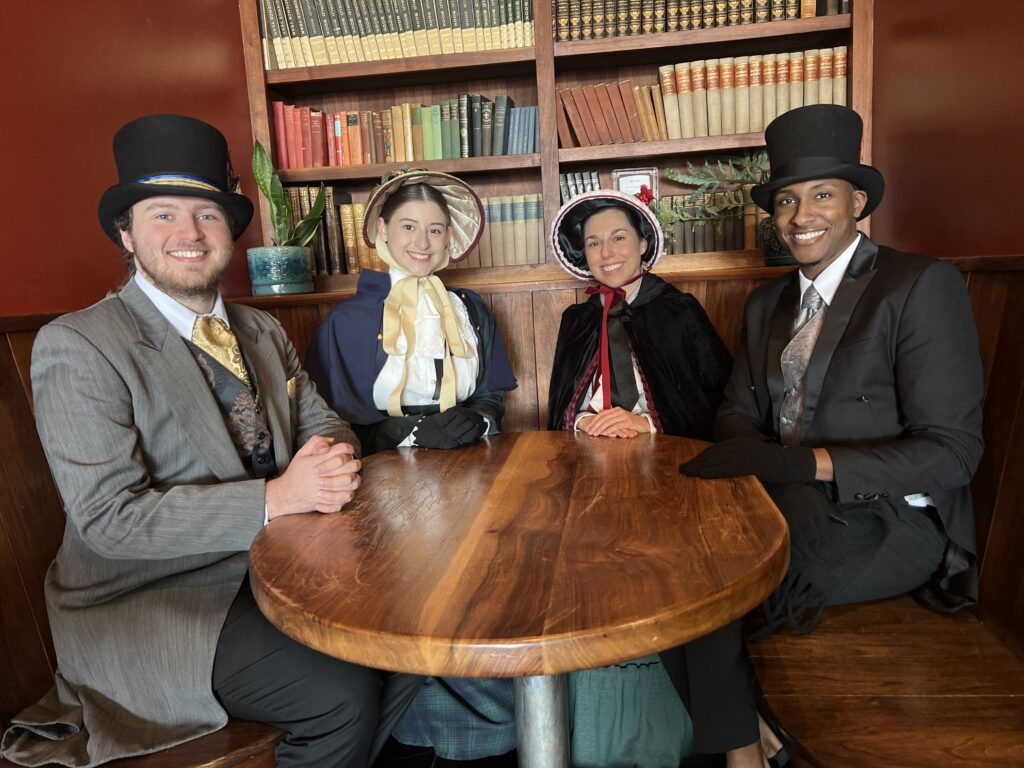
A Retail to Remember
The first question: What is it about Christmas music that hits close to people’s hearts? I’m pretty sure I can answer that with the time I sang at the Hilltop Shopping Center. It was November 30th at 11:45pm, post the peak busy mania of the Thanksgiving-Black Friday weekend, where my quartet met at Nectar Gifts in the Hilltop West section of the shopping center.
It was a pretty easy gig, as it was outdoors, so we were able to walk around Hilltop and practice all of our carols. We stopped in front of some stores and sang theme-specific tunes. For example, we sang the 18th-century English drinking carol, “Gloucestershire Wassail,” in front of the Virginia ABC. There were even shops that invited us inside to sing our carols! The furniture store, Ethan Allen, allowed us to record a video of us walking throughout their store to sing “Santa Baby” for promotional use.
The one store that stuck out to me was The Painted Tree, a craft-artisan marketplace. When we entered inside, it seemed we were right in the middle of a traffic roundabout, as people were passing by from different booth paths, which were organized by street names. The employees were serving a breakfast buffet and a ticket raffle for five prize baskets. The Christmas ambiance was set by the acoustic jams of local musician Karl Wente. When he saw four Dickensian carolers enter, Wente announced on his microphone, “Hello everyone. We hope you’re enjoying your time looking at the different booths. We have some visitors by the name of ‘The Doorway Singers’,” as he looked down at the hanging sign off of the women’s hand warmers.
I was completely surprised by what he did after his announcement: he pushed the microphone stand away from him and into the center of my quartet! “They’re gonna sing some carols for all of you.” My group decided swiftly to sing “The Most Wonderful Time of the Year” and “Jingle Bell Rock,” and it was followed by incredible applause from shoppers and staff alike. Karl gave us all fist bumps and said into the microphone, “Now, how am I going to follow that?” I would say that that specific gig is a day that I will never forget…which answers my first question! Christmas music hits close to people’s hearts because of nostalgia: it reminds them of a happy moment of the past or present during Christmas that they will never forget.
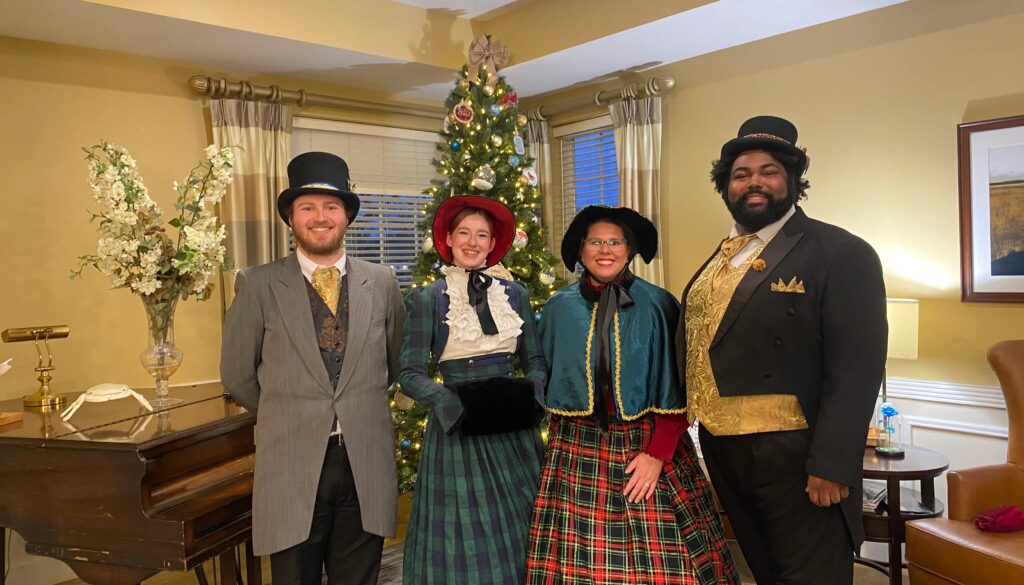
A Cappella’s Lasting Impact
Another gig that I have performed answers two of my questions: How have the older Christmas songs endured into the present-day? What is the striking detail about a capella music that people just love? On Friday, December 6th, I sang at the Hoy Center located in Westminster-Canterbury, a retirement home located in the Shore Drive area of Virginia Beach. It was a big night for the residents, as they were planning to do their Grand Illumination that night. My quartet was set to sing in the side lobby near the elevators, and about thirty of the elderly residents came down to see us bring holiday cheer through our music. There were so many people there we had to go back and forth from the lobby to the chapel area, where a third of the total thirty remained for the gig’s duration.
Most of the elderly folk enjoyed the traditional hymns, which they grew up listening to during the holidays. While we were singing in the chapel, there was one woman in a wheelchair who was happily singing along to our carols. “You guys sound so spectacular!” the kind woman exclaimed. “It’s only the four of you, and you all sound like a full choir!” We thanked her for her sweet words, and then she held up what I thought was her blanket. “Do you see this? This is my old choir gown, and I brought it down here just for tonight.” She complimented us not just as an audience member but as a fellow singer.
All of the old hymns of the Middle Ages into the 19th century have stayed relevant not only because of the church’s sponsorship but because of the community rooted in the tradition of religion. Whether it is Christianity or Judaism, these are songs that provide joy, love, hope, and praise to God for the arrival of the Messiah during any struggles we might be going through. The origins of instruments were created to imitate the qualities of human behavior and voice. With regards to the love of a capella, it is more interesting and complex when music is performed by all singers without instrumentation (or that the “instrumentation” is provided by the vocal cords and mouth placement).
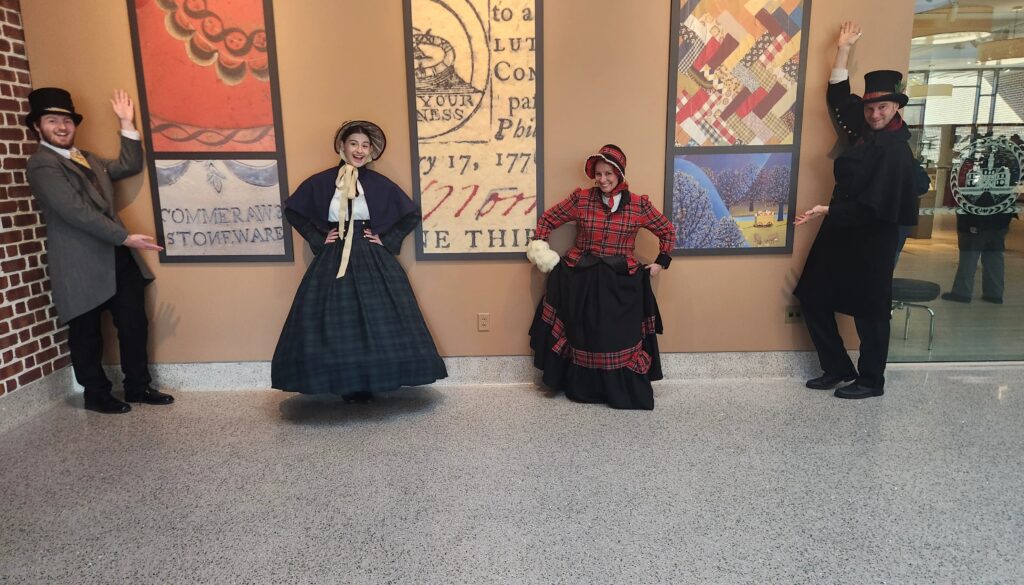
Bringing History to Holiday Life
My fourth question is as follows: How does the Doorway Singers impact the community? I had come to realize the impact we have during the Christmas season during two gigs in Williamsburg. My fourth Christmas gig was at the Williamsburg Christmas Market on the 1st of December, next to the Art Museums of Colonial Williamsburg. It’s similar to The Painted Tree, where there are artisan craft makers selling their products, but is set in a colonial-era market square with red wooden booths. My group that day walked around outside, and as we were singing “The Christmas Song,” at the “Jack Frost nipping at your nose” lyric, a little girl looked up to me and smiled with a cheerful aura. Her smile helped me remember the child inside me, who was full of wonder and joy for Christmas, exactly what my quartet was providing her and the rest of the shoppers that day.
The second gig was Monday the 9th, at the Powhatan Resort. They were holding a private party there in the historic Powhatan Plantation Manor, and we were instructed to sing in the main foyer of the house. As a city of colonial history, folks were just fascinated by our Dickensian costumes (though our clothing dated about a century later). Constantly, people were coming up to us, “You just sound wonderful! Those costumes are absolutely gorgeous! How do you get them?”
One gentleman asked me while I was on my break, “Where did you get your hat?” I replied, “This is a Victorian wool hat that I purchased from Village Hat Shop for about $67,” and he was quite surprised by the price. “Really?! It’s just that much?” he replied, “Well, I am actually part of the Knights Templar, and once my buddy bought the chapeau with the plumes. Mind you, this was back in the 90s. He purchased the chapeau for $300 just because of the rarity of ostrich plumes. He would later buy the same hat a couple years back, and it just cost a measly $1100. Talk about the price jump!” To be quite honest, I didn’t know what he was talking about with his fraternity, but I kindly listened to what activities and missions he was part of. With the Williamsburg gigs, I learned that people were amazed by our vast bank of carols, as well as finding our costumes to be wonderful in a historical aspect. There is a sense of retrophilia, where people are interested in seeing performers wearing fashion and singing songs that have aged over 200 years and still remain beloved in communities today.
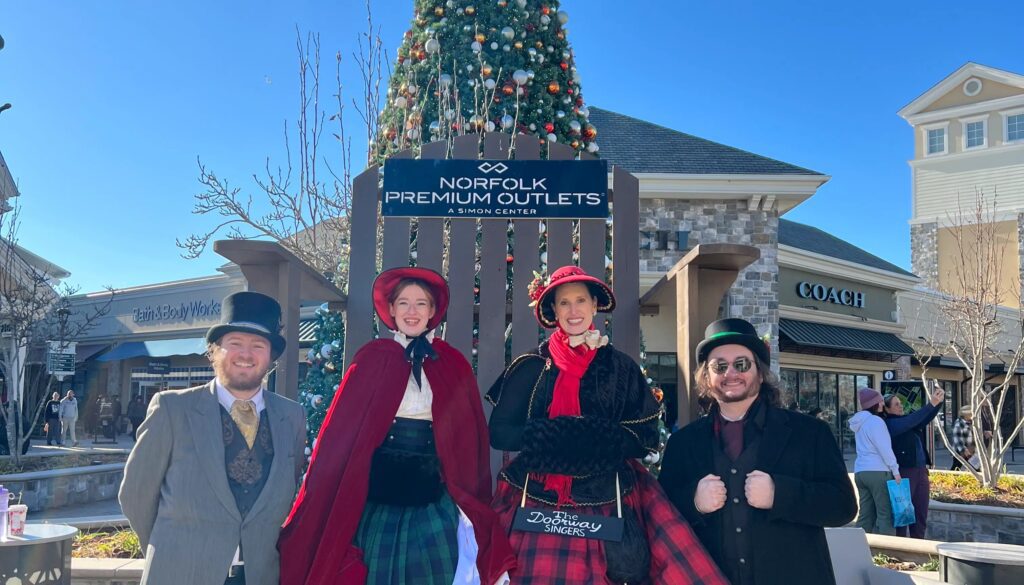
The Heart of The Holidays
Finally, I conclude with answering this question: What does Christmastime mean to me? Well, it definitely means more than expecting gifts and commercialism. To me, Christmas equals a community filled with love, joy, and care. Whether it be through church donations, Christmas caroling, or having dinner with family and friends, there are many ways to show that love, joy, and care to those who need it. Christmastime is a hopeful tradition to celebrate the wonderful blessings and people we have in our present life. Without a doubt, the Doorway Singers spreads this home through caroling in different places. That is what Christmas time means to me.